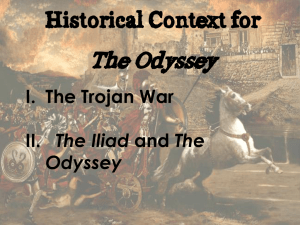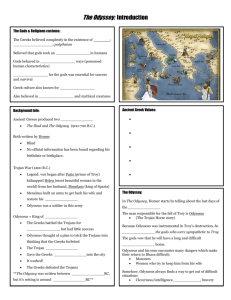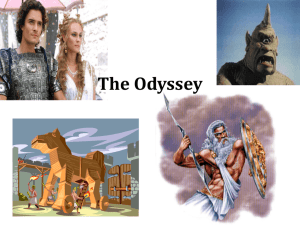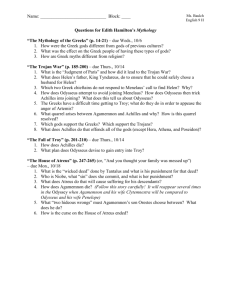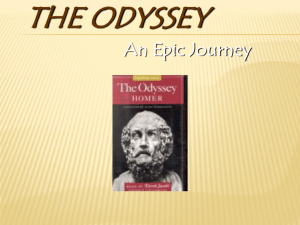The Marriage of King Peleus
advertisement
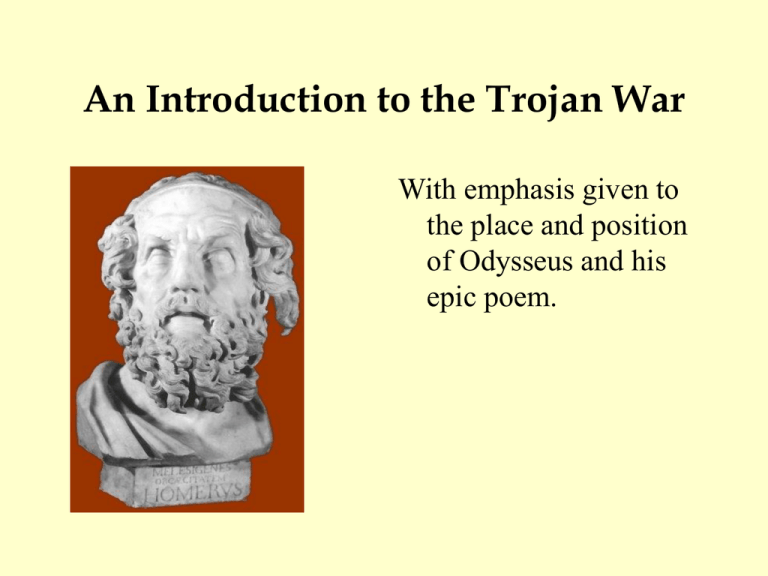
An Introduction to the Trojan War With emphasis given to the place and position of Odysseus and his epic poem. SETTING: GREECE 1250 B.C Review: Myths A myth is an explanation of something in nature; how everything in the universe came into existence (men, animals, trees, the sun, earthquakes, etc) and all that happens Myths are early science but also entertainment Greek mythology is made up of stories about gods and goddesses Greek Pantheon The universe created the gods who lived on Mount Olympus. Zeus, god of the sky • Athena: goddess of wisdom • Helen: most beautiful woman Poseidon, god of the sea • Charybdis: devourer of land • Polyphemus: chief monster of the Cyclopes • Aeolus: keeper of winds Hades, god of the underworld • Morpheus: god of sleep and dreams Origins of the Trojan War Took place between approximately 1260-1250 B.C. Archaeological remains provide evidence that there was a war but cause unknown. Scholars believe the war began over control of the trade route between the Aegean Sea and the Black Sea between the Trojans and Greeks. Ancient mythology states that the war began over a single woman, Helen, queen of Sparta. Marriage of Peleus and Thetis All gods on Olympus invited except ERIS, the evil goddess of Discord Apple inscribed with “For The Fairest” Apple Claimants: – Hera, queen of the gods – Athena, goddess of war and wisdom – Aphrodite, goddess of love Paris, Prince of Troy, will be the judge The Bribe Hera - POWER Athena - WISDOM Aphrodite – HOT BODY, BEAUTIFUL WOMAN Paris chooses Aphrodite Helen of Troy Helen- beautiful daughter of King of Sparta (in Greece) Helen has many suitorsthey swear oath to protect Helen and her new husband Father chooses Menelausmakes him King of Sparta also Paris abducts Helen 1000 ships, including Odysseus & Achilles, leave for Troy Gods Take Sides: Trojans Humans Paris Hector Gods Aphrodite Ares, god of war Apollo, sun god Artemis, goddess of the hunt Zeus (neutral) Gods Take Sides: Greeks Humans Achilles Odysseus Gods Hera Athena Poseidon Trojan War: The Battle Ten years of – hand to hand combat. – periods of temporary truce to bury the dead – no fighting after sunset. Trojan War: Odysseus’ Trick Greeks build a gigantic hollow horse and hide inside Sinon chosen to tell a tale of the Greeks leaving Priest Laocoon tried to warn Trojans “I fear the Greeks even when they bear gifts” Poseidon sent serpent to kill Laocoon Trojan War: Surprise Attack Trojans thought they had won Sinon tells them horse is an offering to Athena - big so Trojans wouldn’t take it Trojans fall for it and drag horse into city gates to temple of Athena Trojan War: The Sacking of Troy In middle of night Greeks leave horse and attack Troy is in flames before Trojans know what has happened King of Troy dead Women and Children become slaves Helen is returned to Menelaus Odysseus’ Mistakes Trojans were slaughtered and city sacked and burned Greeks violated Trojan temples Greeks did not offer sacrifices to the gods to thank them for their victory Odysseus, creator of the Horse, will suffer the most Homer and the Epic Poem The Odyssey The Illiad • Describes the 10-year • First written record of journey of Odysseus as he Greece tries to go home to Ithaca • describes the events of 51 after the Trojan War days during the last year • He and his men face of the war when Achilles monsters, giants, kills Hector cannibals, temptation, and death 500 year gap between the actual war and when the story was written down in 725 BCE. Epic Poems An epic is a story-poem about a great hero who performs daring deeds that require superhuman courage Told orally, not written, recited from memory by minstrels (traveling entertainers) In Greek epics the gods either help or hinder the hero, like in The Odyssey, Poseidon hinders Odysseus while Athena helps him Activity: Timed Writing Using what you have learned in class, write a short tabloid-style story that highlights a character or event that is central to the Trojan War. Please pay attention to all standard writing conventions (i.e. spelling, capitalization, punctuation, etc.) Paris is for Lovers No, not that Paris The King of Troy can’t seem to keep his boys in their chambers, as the impetuous and impulsive Paris, Prince of Troy, secreted himself off to Sparta for a Mediterranean jaunt. Hector, the busy-body older brother, followed “to keep him out of trouble.” Hector’s best efforts failed, though, as he and his younger brother beat a hasty retreat to the war drums of 1000 Greek ships. Their misdeed: taking another man’s wife. Helen, the princess of Sparta famed for her beauty and rumored to be an illegitimate child of Zeus, had been promised to the much older and battle-maimed Menelaus by her father. However, her tastes appear to favor the strength and vitality of youth, as she appeared to put up very little struggle while boarding the Trojan ship. Mount Olympus presented a very divided front on the issue. The conservative block, led by Hera and Poseidon, demanded a swift and immediate return of the Spartan property. Meanwhile, the liberal faction of Apollo and Artemis expressed satisfaction with the choice. Zeus, who is rumored to be at an undisclosed location with the mortal Alcmene, refused to issue a statement. When asked for her take on the story, Aphrodite, the goddess of love who recently received a prize of her own from Paris, exclaimed with delighted giggle, “Paris really is for lovers!”
